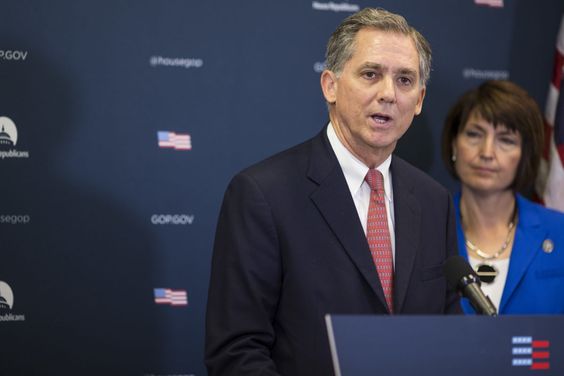The Next Wave of Digital Asset Regulation: A Bright Future Ahead?
In a revealing conversation on CNBC, U.S. Representative French Hill shed light on what could become a pivotal moment for the digital asset space in the United States. With the country poised on the cusp of potentially electing Donald Trump once more, there’s a ripple of anticipation about the future regulatory environment for cryptocurrencies and other digital assets.
According to Hill, the Trump administration, if returned to power, is likely to embrace the recently enacted FIT21 bill. This move is anticipated not just as a nod to the tech-savvy electorate but as a strategic play to maintain the U.S. as a competitive force in the rapidly evolving digital asset domain.
The FIT21 Bill and Its Significance
The FIT21 bill stands as a beacon for clear-cut regulations in the tangled world of digital assets and consumer protection. Its passage reflects a bipartisan effort to establish ground rules that everyone in the crypto space can play by—a move that is seen as essential for fostering innovation while ensuring users are well-protected.
What’s particularly intriguing about this development is the broad support the bill has garnered, transcending party lines and hinting at a shared vision for the future of finance in the U.S.
Digital Assets and the Presidential Race
With the presidential election horizon lighting up, Trump and his Republican allies are pushing for a regulatory environment that’s more welcoming to cryptocurrencies. It’s a stance that aligns seamlessly with the sentiments expressed by other key figures within the political and financial landscape.
Trump himself has made headlines recently with statements endorsing Bitcoin, forging an unexpected bridge between his administration’s policies and the world of digital finance. This pivot towards supporting Bitcoin signals a broader understanding of the technology’s potential to bolster the U.S. economy and counterbalance international economic pressures.
A United Front for Bitcoin?
Trump’s pro-Bitcoin rhetoric echoes that of several other political heavyweights, including potential presidential contender Vivek Ramaswamy and Senator Cynthia Lummis—or as she’s affectionately known, the “Crypto Queen.” These leaders advocate for the integration of Bitcoin into the country’s financial strategies to fortify the nation’s monetary assets.
Lummis, in particular, views Bitcoin not just as a novelty but as a foundational pillar that could add a layer of resilience to the United States’ financial reserves. Her stance underscores a growing recognition of Bitcoin’s merit as a store of value and its potential to diversify and strengthen national economic strategies.
Wider Implications for the U.S. and Beyond
The acceptance and integration of the FIT21 bill, along with the positive disposition towards Bitcoin by leading political figures, paints a promising picture for the future of digital assets in the U.S. This forward-looking approach could set a precedent for other nations, promoting a global shift towards a more inclusive and regulated digital finance landscape.
This shift is not just about staying competitive on the world stage; it’s about embracing the transformative power of technology to advance economic stability, security, and prosperity. With careful regulation and strategic adoption of digital assets, the U.S. can lead by example, paving the way for a robust and resilient digital finance ecosystem worldwide.
Conclusion: The Path Forward
As the presidential election inches closer, the discourse around digital asset regulation and the potential for Bitcoin’s integration into the national financial framework is heating up. The support for the FIT21 bill among Republicans, coupled with Trump’s bullish stance on Bitcoin, highlights a significant shift in the political landscape’s approach to digital currencies.
This evolving narrative not only signals a brighter future for the digital asset space in the U.S. but also underscores the importance of collaboration across the aisle to foster innovation, protect consumers, and secure the country’s position as a leader in the global digital economy.
The journey towards a well-regulated, crypto-friendly United States is just beginning, but the potential benefits for innovation, economic security, and consumer protection are vast. As we look towards the future, it’s clear that the conversation surrounding digital assets and their role in the U.S. economy is far from over—it’s only getting started.
